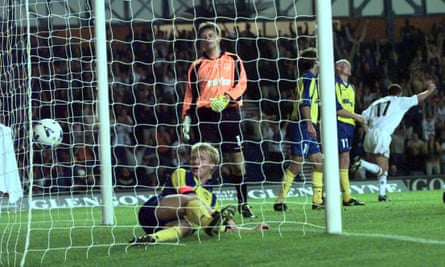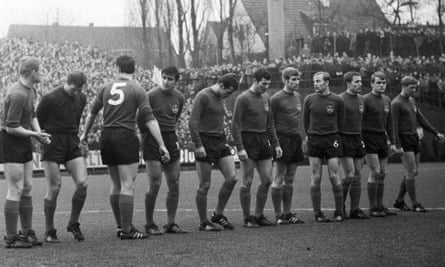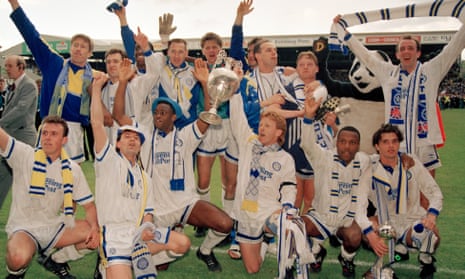HOWARD WILKINSON
Manager when Leeds United pipped Manchester United to the old First Division title in 1992. The following season Leeds finished 17th, two points above the relegation zone.
“It’s one thing coming up on the rails in a title race, as we did in 1992, and quite another starting a season with everyone else in the league thinking: ‘We’re at home against the champions and they’re the team to beat.’ We didn’t win away that following season.
I think some players had run the marathon when we won the title. And then when they reported back it was like someone saying to them: ‘Come on, you’ve got to run it again.’ Some just didn’t have that in them. Plus we lost some of the application because a few started to think: ‘We’ve done all that; now I’m a good player.’ To put it in working-class terms, they stopped rolling their sleeves up and getting their knees dirty, so some of our organisation and discipline went.
To give you an example, our set pieces in the three years prior to that were, statistically speaking, of the highest order. The next season that just wasn’t the case. The first two months we were conceding goals that we’d never conceded in our lives.
Also, and I don’t want to be disrespectful here, but I think some of the players over-performed, so they started to feel the strain of that and then there’s a regression back to normal. They’d been scoring nine out of 10 every week and sometimes, if you looked at them realistically, you’d be thinking: ‘I’d be happy if this guy gave me seven out of 10.’
Eric Cantona left in November of the season after winning the title but it’s nonsense to say that his departure was a big reason for what happened. That hypothesis is based on a false assumption that the season before Eric had a dramatic impact. He started seven games and scored three goals in the title-winning campaign. None of that, of course, is to denigrate Eric and his ability. What I would say is that the 1992-93 season was our one blip, because we had fifth-placed finishes the next two years. Also, to those people that ask: ‘Did the title happen too soon?’ Well, you’re not going to turn it down, are you?
BO HENRIKSEN
Played for Herfolge when they won the Danish Superliga in 2000. Twelve months later Herfolge finished second from bottom and were relegated.
“When I go out and chat to anyone, they’ll say: ‘You were in that team that won the championship in 2000, that amazing story and the most crazy thing that happened in Danish football?’ I say: ‘Yes’. And then they say: ‘And then you got relegated the year after!’ It’s always been like that, like some kind of laughing stock, which is understandable. I don’t blame anyone who says that but it takes a lot away from what happened.
For those not familiar Herfolge were like a team that, at best, avoided relegation every year. We were part-time with by far the lowest budget and the smallest stadium but John Jensen took over as manager and all of a sudden we started winning matches and developed this extraordinary belief that we were unbeatable.
“We were not the best team but we would do anything for each other. Also, most of us hadn’t won anything before, so we wanted to show the world that we were good enough. We won the championship almost out of nothing and everybody went crazy. We partied for three weeks, then came back and had to play European games and in the Danish Superliga again. We started to rotate the team to be able to play in all the competitions and we probably thought we were a little bit better than we were.
But I think the main problem was that the expectation around us was too great – Herfolge were never going to be like FC Copenhagen or Brondby. When the results were bad, the board started putting pressure on Jensen and changing things. We had to train more and we couldn’t play cards or go on the PlayStation. I think if the people at the top start to try to control the dressing room, you are in big, big trouble.
We knew it wasn’t coming from John but it left us feeling we were being punished. After 17 to 18 games that season we knew as players that it could go wrong. But some of the people around the club didn’t believe it until a couple of months later. Unfortunately relegation tarnished what we did the year before. I really hope the same doesn’t happen with Leicester.

GEORG VOLKERT
The former West Germany international was part of the Nürnberg side who won the German title in 1968 and were relegated the following season
“Being a champion the year before, you never think of relegation. You always think that you still have a lot of time to change even if you lose games. At that time you got two points for a win so the whole situation was never that dangerous, in our eyes. And then things change: you lose, you don’t believe in yourself any more. You have no self-confidence, there is fear and your mind is blocked. But at the end you see what can happen. This season was proof that it was a mistake to sell our goalscorer Franz Brungs, who scored 25 goals in the title-winning season.
Our manager, Max Merkel, was sacked with eight games to go. He was hard but fair and very thorough. He was a respected man with authority. During my whole career he was the most important coach I had and he helped me become a player in the national team.
In this business it seems to be normal that you are sacked when you are not successful. The president expected the team to be champions again, a lot of money was invested in the team and the club did not have the time to wait to form a new team. He continued in the same vein as last season but the players were different. So Merkel took his hat and he had to go.
The penultimate game of the season was at home to Borussia Dortmund. With a victory we would have been saved but we could only draw 2-2. So the very last game against Köln we decided our future. The Köln team were in the same predicament as us. Köln coped much better with the situation and for us that was too much pressure and we lost 3-0. Köln were the better team, they fought like maniacs, we had no chance. The mood? It was like the Titanic … that’s it, that was the end but directly after the game you just could not believe it and you did not really realise what happened.

